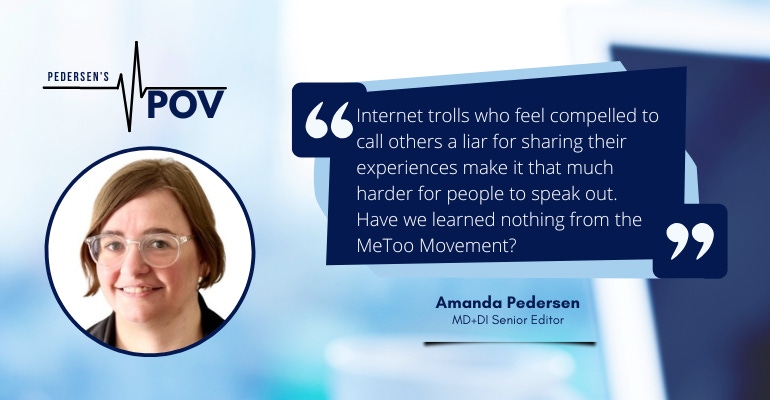Caffeinated Credentials: Female Surgeon Denied Coffee
This week in Pedersen's POV, our senior editor roasts gender bias and double standards in civility.
June 5, 2023

Last week at an academic conference, Mara Antonoff, MD, a cardiothoracic surgeon, stopped to pour herself a cup of coffee before heading into a meeting. She was "wearing a conference badge and dressed professionally," she said in a June 1 Tweet.
The coffee gatekeeper, who was likely a temp hired to help with the event, told her the coffee was only for attendees. When Antonoff confirmed that she was an attendee, the staff member clarified that they meant the coffee was only for "the surgeons."
"My goal in sharing this experience was to highlight the ongoing need to dispel myths and educate others, as we strive to create a surgical workforce in which we all can feel that we belong. This is an opportunity to change perceptions regarding #TheFaceOfCTSurgery," Antonoff said in a follow up Tweet.
Curious about how the coffee gatekeeper could have handled the interaction differently, I reached out to a few of my colleagues on the event side of Informa Markets for their take.
Melissa Magestro, VP and group portfolio leader at Informa Markets - Engineering, said the easiest solution for something like this would be to train event staff (including temps) to check attendee badges and know what badge types (usually differentiated by color) are permitted access to an activity or not. That way the staff member is not relying on their own judgement or assumptions.
While it irks me that women in male-dominated career fields face this type of gender bias on a regular basis, what really has me steamed (coffee pun intended) is the misogynistic backlash Antonoff has received from sharing the experience on social media.
Some commenters said they don't believe Antonoff that this even happened. It is disturbing to me that society tends to assume a woman is lying or exaggerating about an experience like this. The best action against any type of bias is awareness, but Internet trolls who feel compelled to call others a liar for sharing their experiences make it that much harder for people to speak out. Have we learned nothing from the MeToo Movement?
Others are shaming Antonoff for "playing the victim."
"Think we will skip your pity party, and good luck with patients who fail to honor you sufficiently," Tweeted Jeff Cunningham, whose bio on the platform suggests he is a retired professor of journalism, and business.
"No, [your] point in sharing was because you jump to a conclusion that cannot be verified. You’re playing the victim, even though you’re an elitist. As a surgeon, you are part of the elite class and yet here you are playing the victim," Tweeted K9Ranger, whose bio suggests they are a former K9 handler.
The most helpful comment came from Amy Diehl, a gender bias expert, who explained that this is a case of "role incredulity" and linked to an article she co-authored on the topic for the Harvard Business Review.
In the article, Diehl and her co-author, Leanne M. Dzubinski, define role incredulity as a form of gender bias where women are mistakenly assumed to be in a support or stereotypically female role — an administrative assistant, nurse, wife, or girlfriend, for instance — rather than a leadership or stereotypically male role, such as CEO, professor, lawyer, doctor, or engineer.
"In these instances, women must expend extra energy and time to assert and sometimes prove their role. Their words may lack the credibility and authority inherent in their position," Diehl and Dubinsky wrote. "Role incredulity surfaced as a common theme in our research dataset of women’s stories from interviews, open-ended survey responses, social media posts, and public articles."
Another thing that bothered me after reading Antonoff's post is how she felt compelled in follow up tweets to emphasize that she responded to the coffee gatekeeper politely. I've been in situations like this where I've managed (with some difficulty) to respond politely when someone says or does something offensive toward me. I try to focus my reaction on educating the offending person on their mistake rather than stooping to their level and slinging snark, even if it feels warranted at the time.
If this coffee gatekeeper had made the same mistake with one of Antonoff's male colleagues (not likely, but let's just try to imagine such a scenario), would the male surgeon have reacted with grace and politeness?
Men are often encouraged to be assertive while women are expected to be polite at all times. I'm a firm believer in catching more bees with honey, but this double standard in civility has got to stop. Assertiveness is not the same as aggression, and women should have the freedom to assert themselves and share their experiences without fear of repercussions.
About the Author(s)
You May Also Like



.png?width=300&auto=webp&quality=80&disable=upscale)
